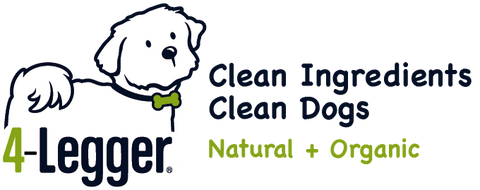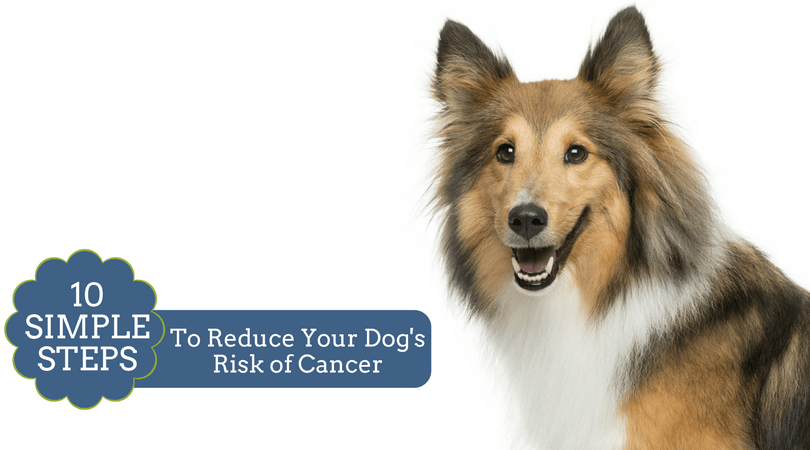10 Simple Steps You Can Take to Lower Your Dog's Risk of Cancer
Statistics show that if you don't take steps to lower you dog's risk, they will be one of over 50% of dogs that die each year from cancer.
Want some good news?
Approximately 95% of dog cancers are attributed to environmental and lifestyle factors while only 5% are genetic.
You have the ability to reduce your dog's chances of being a sad statistic by following our 10 simple steps to lower their risk of cancer! Many of these you will read and think, "That is just common sense". True enough, but they are good reminders nonetheless!

-
Maintain a healthy weight for your dog. It is hard to say no to that sweet face begging for that treat; but saying no may keep that sweet face around longer as being overweight can increase cancer risk in many ways.
The primary risk is that excess weight causes your dog's body to produce and circulate more estrogen and insulin, hormones that can stimulate cancer growth. - Regular Exercise. While regular exercise will help reduce your dog's chances of becoming overweight, it will also help to strengthen their cardiac function, improve circulation, and remove toxins from their body. As a side benefit you also get exercise and it strengthens the bond between you and your dog!
-
Feed your dog high quality food. The foundation for good health is good food. Low quality food shows up in your dog's overall health and is reflected in their skin and coat.
Feeding your dog foods that are full of artificial preservatives increases their exposure to cancer causing byproducts.
The bottom line is, you need to feed your dog the highest quality food that you can afford. Keep in mind, a cheaper food may cost you much more in vet bills later!
Pick food with human-grade ingredients, no cheap fillers or artificial preservatives. Want to see if your dog food measures up?
You can use the Dog Food Advisor website to look up your dog's food and to find one that may be rated higher and in your budget!
- Offer filtered water in a lead free bowl. By 2006, 69% of US states fluorinate tap water thanks to marketing campaigns that promoted fluoride to prevent tooth decay. Unfortunately, the use of fluoride has become so widespread that much of it is now imported from China. Studies have shown that imported fluoride is often contaminated with heavy metals - these heavy metals have links to cancer. Using a water filter that can filter out fluoride is an easy preventative measure you can take to keep your water safer for you and your dog. Speaking of heavy metals - use bowls that are lead free!
- Maintain good dental health. While fluoride may not be the answer for good dental health, keeping those pearly whites clean is important. Toxins excreted by bacteria from periodontal disease damage kidneys, heart, and brain tissue. There are also links between bad oral hygiene and a higher rate of mouth cancer.
-
Reduce or eliminate your dog's exposure to toxic lawn and weed yard treatments. You can have a beautiful yard using organic lawn treatments that are safer for you, your dog, your kids (the ones with two legs), and the bees that pollinate the food we eat!
Check your local listings for "organic yard care".
Keep in mind that your dog walks around in your yard and will later be licking their feet. Those yard chemicals that have links to cancer will be ingested by your dog. -
Minimize vaccinations and switch to titering after the age of 18-24 months. The August 2003 Journal of Veterinary Medicine reported evidence of linkages between vaccines and cancer at the injection site in dogs. This study and others also identified linkages between vaccines and cancer (sarcoma) in cats.
The bottom line: Once your dog has had all of their shots, you don't need to continue with annual vaccinations on your dog (or cat).
This doesn't mean you should skip your annual checkup!
An annual checkup is smart for "preventative maintenance" - checking teeth, weight, blood work, etc.
Ask you veterinarian about titering! Titering is a simple blood test that will show your dog's level of antibodies (immunity). You can titer test for all of the common vaccines such as parvo, rabies, distemper, bordetella etc. Knowing this information, you can greatly reduce your dog's exposure to unnecessary vaccinations!
The average titer test costs $100 - $200 - a cost well worth the peace of mind! -
Wait to spay or neuter until 18-24 months old (while being responsible to avoid unplanned litters).
This is an emotionally charged topic and ultimately, you have to weigh the evidence on both sides. If you are looking for a 100% "do this" prescription, it will be hard to find. Shelters are over-run ultimately you'll have to measure the risk.
Here are the facts: Medium and large dogs spayed or neutered before they turn 1 have a significantly higher risks of osteosarcoma (bone cancer). The 2013 UC-Davis Golden Retriever study (759 dog study) looked at cancer rates and found that the incidence of lymphosarcoma was three times higher in males neutered before 12 months of age. Interestingly the percentage of hemangiosarcoma in females spayed after 12 months was four times higher than that of intact and even early-spayed females. Additionally, 6% of females spayed after 12 months were affected with mast cell cancer, while there were zero cases among the intact females.
The American College of Veterinary Surgeons reports that mammary tumors are more common in female dogs that are either not spayed or were spayed after 2 years of age. The risk of a dog developing a mammary tumor is 0.5% if spayed before their first heat (approximately 6 months of age), 8% after their first heat, and 26% after their second heat. A UK study refutes this data! Now enter the issue of endocrine issues and metabolic diseases associated with early spay/neutering. Learn more.
Weighing all of the evidence from the studies, it seems that delaying does have advantages over spaying early. Consider asking your vet about alternatives to spaying/neutering such as tubal ligation, hysterectomy, and vasectomy (which are more popular in the UK over spaying/neutering).
Want to read some more? 3 Reasons to Consider Delaying to Spay/Neuter -
Lower or eliminate the use of topical flea and tick treatments. The links between topical flea and tick treatments to nervous system and thyroid toxicity, altered thyroid hormones, liver and kidney toxicity, and cancer are scary.
Monthly use of topical flea and tick treatments pose a serious long term health risk to your pets.
Of course, there are also risks of completely eliminating the use of topical flea and tick treatment - lyme disease for example.
While natural options may not be as convenient, they are safe.
Need some ideas? Nematodes in your yard, external use of food grade diatomaceous earth, essential oils, non-toxic yard treatments, garlic, and more.
If you aren't comfortable with complete elimination, consider reduction by not using topical flea and tick season during the winter months. -
Reduce exposure to toxic grooming products by using 4-Legger certified organic dog shampoo! Did you know that less than 2% of pet grooming products are truly all natural? Many brands have "organic" in the title or say "all natural" but when you look at the ingredients you learn they are over-priced "greenwashed" imposters.
Here are their tactics:
- They use trendy "green" sounding and earth friendly language to market their product in an effort to make the product appear all natural!
- They combine a few organic ingredients with others that have links to health issues. When you see the good ingredients, you tend to ignore the others.
- They don't list any ingredients and simply claim it is all natural.
- They incorporate the word "organic" into the title of the product or the name of the company to make you believe the overall product is organic when it is not.
- They claim "derived from natural ingredients" and then subject those natural ingredients (like coconut oil) to synthetic chemical reactions. The end result is your dog's shampoo is contaminated with synthetics that have links to health issues such as hormone disruption, allergies, dry and itchy skin, and cancer.
If you want a true natural option, purchase 4-Legger USDA certified organic dog shampoo.
Why certified organic? We wanted to demonstrate our company's commitment to ingredient purity and product integrity. Since there are no regulations in the pet grooming industry, we felt independent third party oversight by the National Organics Program (NOP) was the only way we could show pet parents that we truly cared about the quality and safety of our products.
4-Legger isn't your typical dog shampoo company - we're better and safer - because for us it is personal. We are on a mission to change an industry - making it safer for both you and your dog.
We urge you to start taking simple steps, like using 4-Legger Certified Organic Dog Shampoo, to lower your dog's exposure to environmental toxins for a long and happy life!
About 4-Legger's Founder: Melissa Boland
 A cancer survivor, Melissa has dedicated her life to educating pet parents about ingredients and the development of safe and non-toxic alternatives you can trust! Melissa founded 4-Legger after losing a dog to cancer on the day she was diagnosed with cancer herself. She is a contributing author for Dogs Naturally Magazine and a proud mother to three happy & healthy 4-Leggers!
A cancer survivor, Melissa has dedicated her life to educating pet parents about ingredients and the development of safe and non-toxic alternatives you can trust! Melissa founded 4-Legger after losing a dog to cancer on the day she was diagnosed with cancer herself. She is a contributing author for Dogs Naturally Magazine and a proud mother to three happy & healthy 4-Leggers!




